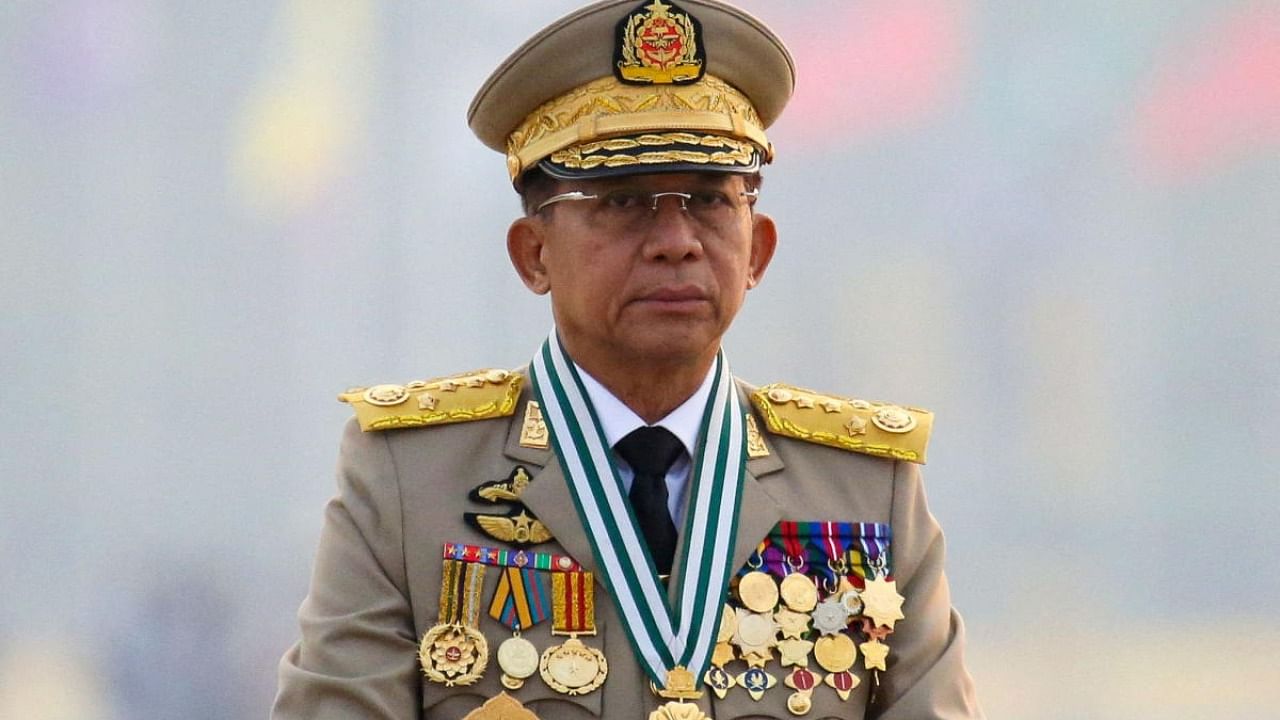
The head of Myanmar's military government appealed Saturday for national unity among the country's restive ethnic minorities as he presided over a parade marking the 75th anniversary of a historic agreement that has failed to ensure harmony.
Senior Gen. Min Aung Hlaing, head of the military council that seized power last year from Aung San Suu Kyi's elected government, praised the minorities for signing the 1947 Panglong Agreement, which was supposed to unify ethnic groups following decades of British colonial rule.
But the army's seizure of power last year has added to the decades of nearly constant conflict after an insurgency erupted in opposition to military rule.
Protesters initially staged peaceful demonstrations but armed resistance grew after they were put down with lethal force. About 1,500 civilians have been killed but the government has been unable to suppress opposition. Some UN experts have characterised the conflict as civil war.
Periods of armed conflict have alternated with fragile cease-fire agreements as civilian and military governments alike, dominated by the Burman majority, have been unwilling to implement a political agreement acceptable to minority groups.
Complicating the situation are alliances that opponents of military rule have formed with some of the minorities, who maintain guerrilla forces with decades of combat experience.
Min Aung Hlaing in a prepared statement released Saturday acknowledged that the conflicts with the minorities have yet to be resolved, saying that had slowed the country's development.
He later oversaw the parade in the capital Naypyitaw with members of the armed forces and government ministries marching past. It also included dozens of elaborate colourful floats representing the country's regions where the minorities predominantly live.
"The patriotic spirit is defined as adoring the own country, national races, language, literature and culture and having a feeling against the encroachment on the nation and the national races,” he said. “The weak patriotic spirit can bring terrible danger to the national and the national races.”
His government is trying to revive talks with the ethnic minorities, inviting them for a new round coinciding with Saturday's anniversary.
Opponents of military rule urged a virtual boycott of the anniversary ceremony, which they described as wasteful, especially with the country still facing a significant challenge from the coronavirus pandemic.
They told people not to turn on their televisions while the parade was being broadcast and not to circulate photos of the ceremony on social media, claiming it would only serve to boost Min Aung Hlaing's image.
At the same time, the armed wing of the resistance carried on with what has become a persistent campaign of urban guerrilla actions, complementing resistance in the countryside.
Various groups claimed on social media to have carried out bombings in Naypyitaw and Yangon, the country's biggest city.
A group in Naypyitaw said it set off bombs at a police station and a market on Friday night, just hours before the ceremony began. Groups in Yangon claimed to have attacked a military vehicle and bombed a generator for the military-owned mobile phone network operator Mytel on Saturday morning.
The claims could not immediately be confirmed but such actions have become a near-daily occurrence and are often reported in the military's statistics.
In apparent anticipation of trouble, the authorities ordered mobile phone operators to cut off mobile data services for most of Saturday, leaving only Wi-Fi available.
In a customary gesture for national holidays, Min Aung Hlaing also announced an amnesty for more than 860 prisoners, state-run newspapers reported. As of Friday, the government was keeping 9,087 people under detention, according to the Assistance Association for Political Prisoners. It was unclear how many political detainees were among those being freed Saturday.
Watch the latest DH Videos here: